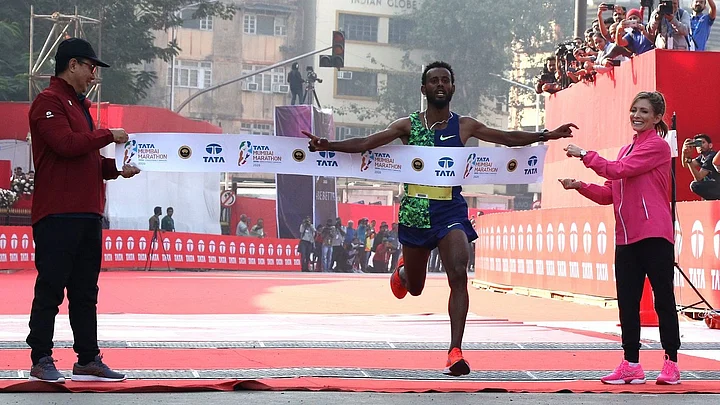Ethiopia’s Derara Hurisa usually runs wearing Adidas shoes although he doesn’t have a contract with the sportswear company. However, at the recently-concluded Mumbai Marathon on 19 January 2020, the 22-year-old had to sport a pair of Nike ones after borrowing it from his compatriot Abraham Girma. Reason? He apparently misplaced his shoes.
Indeed, a blessing in disguise.
Hurisa smashed the course record and clocked 2:08:09s, to lead an Ethiopian podium comprising Ayele Abshero (2:08:20) and Birhanu Teshome (2:08:26).
But besides the trio hailing from the same country, what hogged the limelight as the runners crossed the finishing line near the Chhatrapati Shivaji Maharaj Terminus was that they all sported Nike’s controversial Vaporfly shoes.
In fact, not just Hurisa, even Abshero and Teshome bettered the course record of 2:08.35 set by Kenya’s Gideon Kipketer in 2016.
Overall, seven runners in the elite men’s category ran under the 2:10:00 mark.
Technological Doping?
The controversial pair of shoes came under the scanner after Rio Olympic gold medallist Eliud Kipchoge wore them to run the first sub-two hour marathon in October last year.
Although it wasn’t an open event and the feat is not recognised as an official record, it still drew sharp criticism from the athletics fraternity who slammed the shoes stating it was unethically aiding the runner.
It’s owing to the presence of carbon plates in the sole of a Vaporfly shoe that research proves helps an athlete lose less energy with each step. Thus, besides protecting the feet when it lands on the ground, the variant of the Nike shoe also ensures the foam and carbon fibre sole propels an athlete for his/her next step.
In short, for two athletes of equal calibre, built and strength, the one with the shoes is expected to outdo the one without it.
The matter has been brought to the notice of IAAF as well with the athletics organisation forming a body to set the rules straight.
“The IAAF Technical Committee has established a working group to consider the issues and, if necessary, recommend changes to the technical rules,” the IAAF recently said in a statement. “The working group includes two former athletes alongside experts in science, ethics, footwear, biomechanics and law, and is expected to report back by the end of the year.”
‘Shoes Are Fair’
Quite naturally, those who have benefited from using the shoes have not felt they have had an extra assistance. And it’s not just Kiochoge who perhaps has a lot more at stake.
Defending Mumbai Marathon champion, Cosmos Lagat, when asked about the impact of the shoes prior to the race told reporters: “These are like normal training shoes. It’s about the person running, not about the shoes. There’s no difference. No impact.” Lagat had dropped out of the Mumbai Marathon at around the 14-km mark on Sunday.
Kipchoge, however, went a notch ahead in his defence and compared marathoners to Formula 1 cars.
“In Formula 1, Pirelli issues the tyres to all the cars but Mercedes are the best one. Why? It’s the engine. It’s the person.”Eliud Kipchoge, current marathon record holder
“So for those that are against the shoe, it’s the person who is running, not the shoe. It’s the person driving, not the person making the tyres,” Kichoge had told The Telegraph.
But here’s the thing, Kipchoge. Besides tyres, an F1 car has a body, chassis, engine, aerodynamic modulations among other technical details, and more importantly has a different type of tyre fitted according to the track.
One doesn’t go out with an intermediate tyre on a dry day and soft ones on a rainy one! And here’s where the problem lies with Vaporfly shoes — the undue advantage that it hands out regardless of the track, weather condition, etc.
Will the Records Stand?
At present, not only are the two world records – men and women – been created using Vaporfly shoes, but such has been the reach of the product that even in Mumbai, a majority of the runners in the Elite category could be seen using it on Sunday.
Kipchoge had previously rewritten history books in 2018 when he bettered Dennis Kimetto’s mark at the Berlin Marathon, but even then, he was wearing a prototype of the Vaporfly shoes.
Kipchoge’s compatriot Brigid Kosgei, too, had worn Vaporfly shoes when she smashed Paula Radcliffe’s 16-year record at the Chicago Marathon last year, bettering it by a staggering 81 seconds.
Following Kosgei’s victory, there was a bit of a hue and cry even back then too, but given that there were no rules prior to the race of one not being allowed to sport Vaporfly shoes, chances are, the records will stand.
Thus, if anything stands to lose when the IAAF committee announces its decision later this month, it’s probably Nike and their controversial product.
It can be argued that if a Vaporfly anyway hands an equal amount of advantage to all, why can’t everyone be using it?
The problem is, besides the price of the product – Rs 15,000 in India – which may not be feasible to all athletes; several top athletes are often contractually bound to other sportswear companies.
Athletics, or for that matter marathons, will tend to lose if the sport only ends up being a contest between sports brands. While ‘Impossible is nothing’ and one ought to ‘Just Do It’, a fair platform is also expected to ensure those words just don’t end up as campaign slogans.
(At The Quint, we question everything. Play an active role in shaping our journalism by becoming a member today.)
